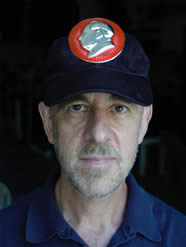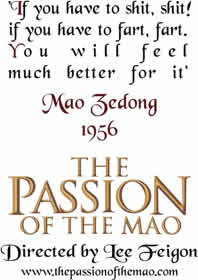 “The Passion of the Mao” begins by correcting misconceptions about Mao’s early years. Unlike the tyrants with whom he is usually compared, Mao was a successful scholar and businessman before he became a rabble-rouser.
“The Passion of the Mao” begins by correcting misconceptions about Mao’s early years. Unlike the tyrants with whom he is usually compared, Mao was a successful scholar and businessman before he became a rabble-rouser.
By the mid1950s, he had unified China, spurred an impressive rate of growth, restructured the education system, and improved living standards.
Then he became a Maoist. Mao devoted the rest of his life to eliminating the centralized Soviet bureaucracy he and his colleagues had built.
The film takes viewers back to the 1960s. Successful women and men, some now professors at major universities in the West, credit Mao and especially the Cultural Revolution for making them feminists and allowing them access to education.
Bijan Tehrani: What inspired you to make “The Passion of the Mao”? How and when did you find the facts that contradict the written history about Mao?
Lee Feigon: I’ve been a professor of Chinese history for almost twenty years, so finding the facts was an easy job. My book on Mao came out a couple of years ago. I’ve always wanted to make films, and the material I had on Mao seemed perfectly suited to it. When I was in graduate school, I took a summer off to take filmmaking classes. I loved them, but eventually I went back to grad school and wrote my dissertation. Two years ago, when I bought a new computer for my daughter, I noticed it came with software that enables users to edit home movies. Why, I thought, couldn’t I use similar software to make a documentary on Chairman Mao’s life?
Bijan: To a lot of people Mao’s story is too old to be dealt with–they say with everything that is happening in the world today, there are more immediate matters to be addressed by filmmakers. What do you say to that and why do you think making “The Passion of the Mao” was important?
Lee: China is rapidly becoming one of the most important and vibrant countries in the world. There’s a myth that all these changes began in 1976 when Mao died. It’s good for people to understand how much what is happening in China today owes to  Mao. And some of the methods of warfare that Mao developed are confronting Americans today. Anybody who had studied Mao could have predicted some of the problems U.S. troops are having in Iraq today. And don’t forget, Mao also has a lot to say about education.
Mao. And some of the methods of warfare that Mao developed are confronting Americans today. Anybody who had studied Mao could have predicted some of the problems U.S. troops are having in Iraq today. And don’t forget, Mao also has a lot to say about education.
Bijan: I think you are a very brave filmmaker. You are showing a new face of Mao, a leader who has been condemned as a brutal dictator from all sides. Soviets communists and parties following them hated him for changing the soviet style Chinese government and the capitalist world blankly denounced him as a dictator after a while. Even in China his successors tried to wipe out all his footsteps from changes made to the Chinese lifestyle in all aspects. Do you think your movie will change these people’s minds?  Lee: I hope so. A number of people have told me as much. What’s really surprised me are all the people who lived through the Maoist years and have come and seen the movie. Many of them have come up to me crying (and it’s not really the type of movie that makes you cry) to thank me for at least telling their story.
Lee: I hope so. A number of people have told me as much. What’s really surprised me are all the people who lived through the Maoist years and have come and seen the movie. Many of them have come up to me crying (and it’s not really the type of movie that makes you cry) to thank me for at least telling their story.
Bijan: A friend of mine, a film critic from Czech Republic who has spend most of his life under the communist regime told me that no movie about a communist leader can change his mind. He thinks there is no way that a communist regime could have had a progressive side and only someone who has not lived under a such kind of rule can praise it. I assume that a lot of intellectuals from ex-communist countries may feel the same. What is your take on this?
Lee: My book on Tibet has been translated into Czech and published in the Czech Republic, where it has been well received. I have not talked about Mao in the Czech Republic, but I have done so in universities in Hungary. There were some people in Hungary, especially people whose families had such a bad experience under Communism, who didn’t want to hear anything good about them. But many others were open, even sympathetic, to what I had to say.
Bijan: How did you come up with the storytelling style of the “The Passion of the Mao”? Besides being entertaining, does  it also make the movie more effective and give it additional dimensions?
it also make the movie more effective and give it additional dimensions?
Lee: Partly it was just me. I wanted to talk about Mao, but I thought it would go over better if it was humorous. Some of my former students who have seen the movie have said that it is just the way I teach. But I also had a purpose in making it humorous. The one big problem with Mao is the way he was deified. I use the humor and off- beat style to attack Mao’s deification, mostly by talking about some of the wackier elements of his personal life.
beat style to attack Mao’s deification, mostly by talking about some of the wackier elements of his personal life.
Bijan: What is the material you used in making of the “The Passion of the Mao”? Were people who you interviewed for the movie surprised by your move and the angle you have chosen to tell the Mao’s story?
Lee: Most of the people I interview were people whose writings I had already used in my book. So they weren’t surprised by what I had to write. Getting the archival material was a problem. I got archival clips from literally all over the world. I eventually found the most pristine footage in what had once been Soviet archives. But they wanted to charge prices that I could not pay.
Eventually it came out that these people were paid little, and that I might get a good deal if I wired money into certain Swiss bank accounts. My family and friends thought I was nuts. I was wiring money to strangers in Russia, in India, in China. They all came through. The only people who screwed me were some guys in California.
Bijan: Did you face any challenges in making “The Passion of the Mao”?
Lee: Well let’s see. I hadn’t made a film in 20 years. I had to have my 17-year-old nephew teach me how to use Final Cut Pro. I needed animation to make the film work. The animators I spoke to in the U.S. were much too expensive, so I found some Indian animators on the Internet. They turned out to be fantastic.
Bijan: Has there been any reaction to the movie from the Chinese government?
Lee: The Chinese government will not show the film. And they have already interfered with a possible Hong Kong showing.
Bijan: Please tell us about your background.
Lee: I was born in Tampa, Florida. I have a B.A. from the University of California, Berkeley, a M.A. from the University of Chicago, and a Ph.D. in Chinese history from the University of Wisconsin, Madison. While taking Asian studies classes, I briefly took a sabbatical from graduate school to attend film school. After my dissertation was accepted for publication by Princeton University Press, I went on to a career as a professor of Chinese history and chair of the Department of  East Asian Studies at Colby College. Now a research associate at the Center for East Asian Studies of the University of Chicago, I write frequently about East Asian politics, economics, history, and culture for publications such as The Wall Street Journal, Barron’s, the Nation, the Chicago Tribune, the Atlantic, and the Boston Globe. I have been interviewed on television shows such as PBS’s News Hour, CNN, Hardball CNBC, and the NBC Nightly News. I also have built and designed the northern-most completely solar-heated house in the northern hemisphere.
East Asian Studies at Colby College. Now a research associate at the Center for East Asian Studies of the University of Chicago, I write frequently about East Asian politics, economics, history, and culture for publications such as The Wall Street Journal, Barron’s, the Nation, the Chicago Tribune, the Atlantic, and the Boston Globe. I have been interviewed on television shows such as PBS’s News Hour, CNN, Hardball CNBC, and the NBC Nightly News. I also have built and designed the northern-most completely solar-heated house in the northern hemisphere.
Bijan: What are your future projects?
Lee: I’m working on a dramatic feature of a 16th century feminist Chinese novel. It’s a kind of Chinese feminist novel of manners. It’s going to be a real movie, but one that presents a very different China from that with which most people in this country are familiar.
Screening times at Santa Barbara International Film Festival:
Center Stage Theater
751 Paseo Nuevo (right off
Saturday, January 27th, 9:30 p.m.
Saturday, February 3rd, 7:00 p.m.

